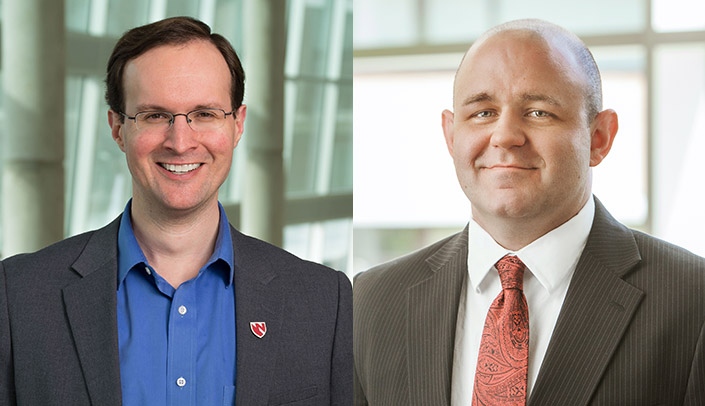The University of Nebraska Medical Center is part of an $450 million, four-year grant from the National Institutes of Health (NIH) to study up to 20,000 adults and children to better understand the full scope of post-COVID symptoms with the goal of improving treatment and health outcomes.
Some of the questions to be asked by NIH’s National Heart, Lung, and Blood Institute RECOVER research study include how many Americans have long-term effects from COVID, what their symptoms are, and how the effects occur in the body.
“There’s not a good sense of how prevalent or what long-term side effects there are with Long COVID post syndrome. The intent is to figure it out. There’s a lot of disagreement,” said David Warren, PhD, assistant professor in the UNMC Department of Neurological Sciences and co-principal investigator of the research study. “We’re excited to be able to contribute to a national effort. UNMC’s participation ensures that Nebraskans will be represented.
“It’s important that we understand what post-COVID looks like. It will help us understand the future of American health care, since most Americans have had it,” he said.
As many as 60 percent of those nationwide were infected with COVID, according to the Centers for Disease Control and Prevention.
The UNMC team hopes to complete enrollment of 85 participants by fall. UNMC’s participation in the adult arm of the RECOVER (Researching COVID to Enhance Recovery) study is as part of a consortium led by West Virginia University.
Dr. Warren and co-principal investigator Andrew Vasey, MD, said those who may be eligible for the research study are adults 19 years and older who have had COVID as well as those who don’t think they have had COVID. The national research study will enroll about 17,700 adults, which includes about 15,000 who have had COVID and about 2,700 who have not.
Russell McCulloh, MD, principal investigator for the pediatric portion of the study, said children also can participate, from infants to 18 years old, as well as those up to 25 years old who still see pediatric providers. UNMC is participating in the pediatric arm of the RECOVER study as one of 14 sites in the Arkansas Children’s Research Institute hub consortium.
“We don’t know the long-term effects of COVID-19 on children’s health and development,” said Dr.McCulloh, associate professor of pediatrics at UNMC and division chief for pediatric hospital medicine at Children’s Hospital & Medical Center. “We know that many children suffer persistent symptoms from COVID-19 that can last weeks or months, in addition to those who have suffered severe acute illness from multi-system inflammatory syndrome.”
Participants may make two to four visits a year. Involvement could include anything from being asked for information about their health, symptoms, physical activity and sleep between visits as well as a medical checkup. In some cases, they may be eligible to receive medical tests.
There will be no treatment for the post-COVID syndrome as part of RECOVER, but the research team may follow up with participants’ physicians about test results or opportunities for other post-COVID research.
(Clinical trial protocol 0766-21-CB).
For more information about adult eligibility, contact: recover.study@unmc.edu
For the pediatric study, the contactis: recoverpeds@unmc.edu
To learn more information, go tohttps://recovercovid.org/research-works.
